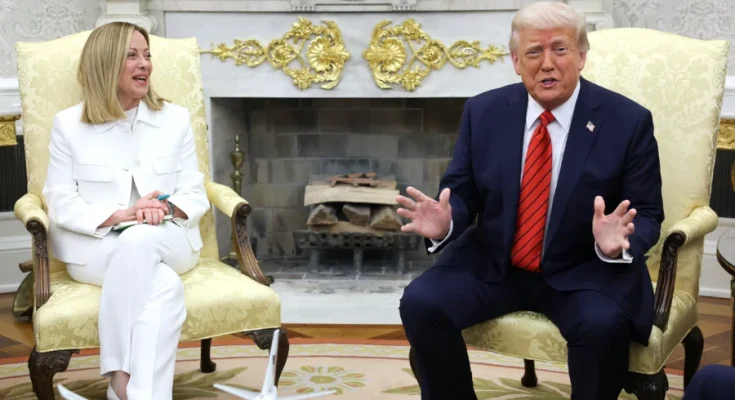WASHINGTON—President Donald Trump welcomed Italian Prime Minister Giorgia Meloni to the White House on Thursday, with both leaders signaling confidence that a trade deal will emerge with the European Union.
Trump said that he has “very little problem making a deal with Europe, or anybody else, because we have something that everybody wants.”
He dismissed concerns about China’s escalation of tariffs with the United States and attempts to win over trade partners in the ongoing trade dispute.
“Nobody can compete with us, nobody,” Trump said. “I think we’re going to make a very good deal with China.”
Meloni is expected to play a significant role in calming trade tensions between the United States and the European Union.
“I’m sure we can make a deal, and I’m here to help on that,” she told reporters before the two leaders entered the Oval Office for further discussions.
The president praised the Italian prime minister, saying, “She’s doing a fantastic job in Italy. We’re very proud of her.”
Trump is expected to reiterate his expectation that Italy and all other EU countries do their part to be good trade partners with the United States, a White House official told reporters during a call on Thursday, previewing the meeting.
“This visit is not just based on the strong bilateral relationship between United States and Italy with our shared allies interest, but also on Meloni’s role as a key force in Europe and a voice that largely sees eye to eye with the president on a lot of issues like immigration and the war in Ukraine,” the official said.
“I think she’s increasingly playing that role in the European Union. I think a lot of other states are grateful for her leadership. …We certainly see her as a valuable interlocutor with the DC.”
In 2024, the United States had a trade deficit of $235.6 billion with the European bloc, a 13 percent increase over the previous year.
On April 2, Trump announced a 10 percent baseline tariff on nearly every country and added higher, reciprocal tariffs on a number of key trading partners, who made the “worst offenders” list. The list included the European Union (20 percent), Japan (24 percent), Taiwan (32 percent), and South Korea (25 percent).
Soon after, Trump introduced a 90-day pause on the reciprocal tariffs for countries that expressed a willingness to enter negotiations, though the 10 percent baseline tariff remains in effect.
The EU is currently facing three different U.S. tariffs—a 25 percent duty on automobiles, a 25 percent tariff on steel and aluminum, and the across-the-board 10 percent tariff.
European products that are most impacted by these high tariffs are medical and pharmaceutical products, motor vehicles, and other machinery goods. And Germany, Ireland, and Italy had by far the highest trade surplus with the United States compared to other EU countries in 2024.
“We know we are in a difficult moment,” Meloni said this week in Rome. “Most certainly, I am well aware of what I represent, and what I am defending.”
As a European leader, Meloni has the opportunity to open the way for more in-depth and constructive U.S.–EU trade talks.
Meloni was the only European head of government to attend Trump’s inauguration in January.
Prior to the inauguration, in January, Trump extended an invitation to the prime minister to meet at his Mar-a-Lago resort. During the visit, the two leaders had dinner and participated in a panel discussion with Trump supporters.
“This is very exciting, I’m here with a fantastic woman, the prime minister of Italy,” Trump told his guests. “She’s really taken Europe by storm and everyone else.”
Ukraine and Article 5
During her meeting at the White House, Meloni may also discuss extending NATO’s Article 5 to Ukraine.
In March, Meloni proposed to extend NATO’s Article 5, the alliance’s collective defense commitment, to Ukraine without the country’s membership. Article 5 is the cornerstone of the alliance, stating that any attack on one ally is considered an attack on all allies.
She is expected to propose creating a mechanism based on “voluntary participation” in the structure of NATO to protect Ukraine.
A White House official who wished to remain anonymous told The Epoch Times that Meloni’s plan is not agreeable to Trump.
Non-Tariff Barriers
Meloni is expected to propose a zero-to-zero tariff deal with Trump. However, the Trump administration’s major focus has been on the EU’s non-tariff barriers.
Most recently, Europe proposed zero tariffs on industrial goods, but excluded agriculture and left many non-tariff barriers in place.
“Europe is always ready for a good deal,” European Commission President Ursula von der Leyen said during a press conference on April 7 in response to Trump’s reciprocal tariffs.
However, one of the most persistent complaints from some trade experts and economists has been the rise of non-tariff trade barriers—regulatory, fiscal, environmental, and even packaging standards that subtly block American goods abroad.
Tomas Philipson, professor of public policy studies at the University of Chicago, echoed this sentiment in a recent op-ed in National Review, highlighting a $117 billion trade deficit in biopharmaceutical products, despite America’s leadership in the space.
“For decades, European governments have been leeching off American research and development by imposing stringent price controls on drugs,” Philipson wrote.
These price controls function as a non-tariff barrier, because they delay and reduce U.S. exports into the EU, he said.
He said that EU leaders were arguing that “President Trump is starting an unprovoked trade war.”
“But for Life Sciences, the truth is that Europe started the conflict decades ago when its leaders decided to force American patients, taxpayers, and companies to pick up the tab for their socialist healthcare systems,” he said.



